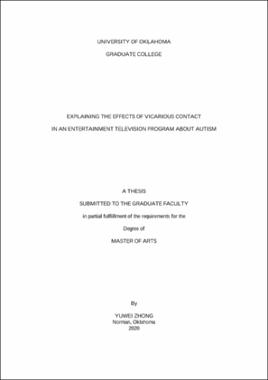| dc.description.abstract | This study is designed to further examine the mechanisms behind vicarious intergroup contact and the effect of exposure to a narrative about an autistic individual on reducing intergroup prejudice towards an autistic population. Based on the vicarious contact hypotheses (e.g., Mazziotta et al., 2011), social cognitive theory (Bandura, 1986), and narrative persuasion (e.g., Moyer‐Gusé et al., 2017), three hypotheses are proposed that consider the role of identification, self-efficacy, intergroup anxiety, and perceived positive valence of contact in reducing intergroup prejudice towards autistic individuals and increasing willingness to engage in future contact with autistic individuals.
An online experiment was conducted using a video clip from a television program featuring interactions between an autistic character and non-autistic characters (experimental condition), and a clip from a TED talk on the topic of autism (control condition) as the stimuli to test the hypotheses. It was expected that the results from the experiment reveal that vicarious contact with an autistic character increases one’s perceptions of self-efficacy, reduces intergroup prejudice towards autistic individuals, and increases willingness to engage in future contact with autistic individuals. The results, their implications, limitations, and future research directions were discussed in connection with the vicarious contact hypotheses, social cognitive theory, narrative persuasion, and the findings of previous literature. | en_US |

